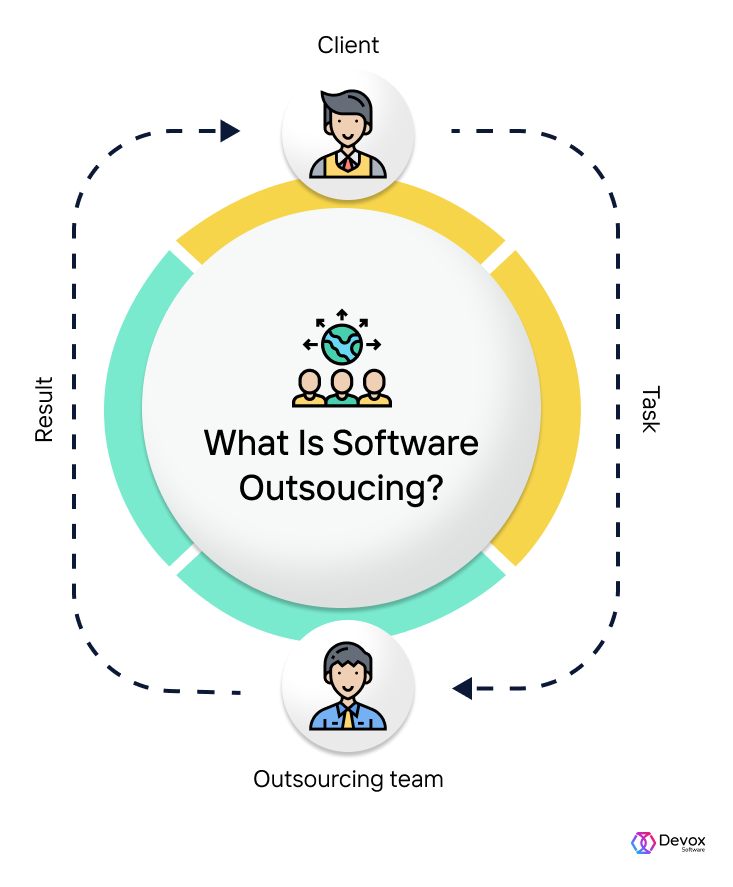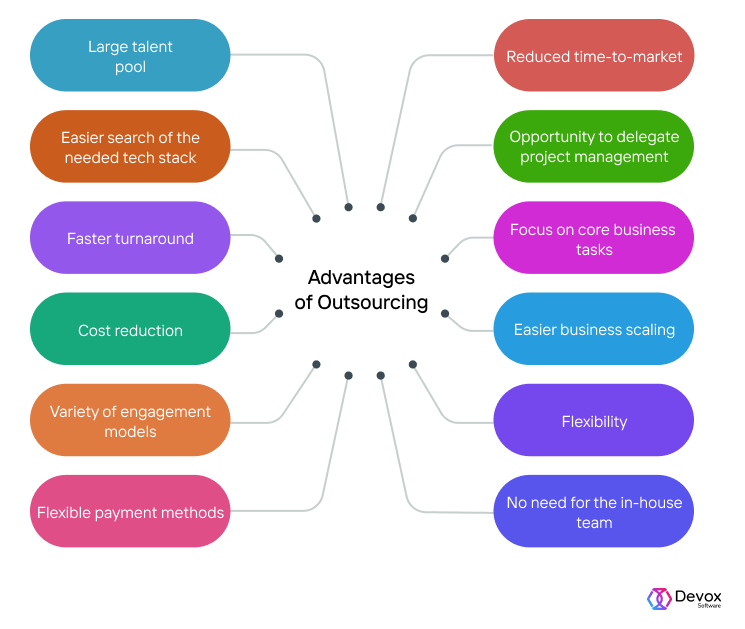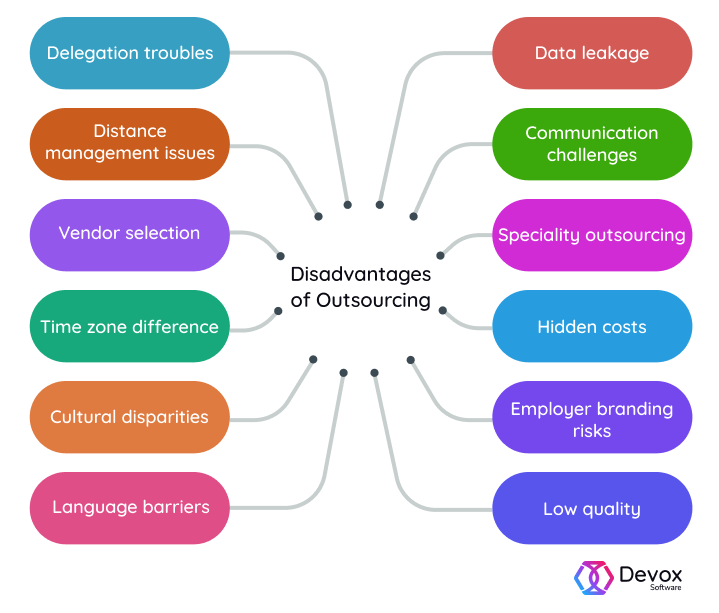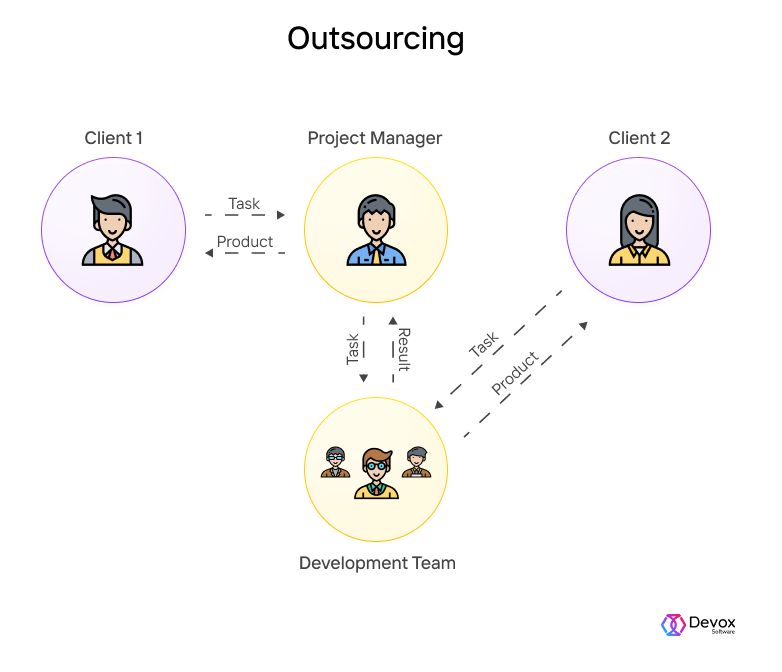
An Overview of Software Outsourcing: Providers, Strategies, and Trends

Blog >
Software outsourcing means handing over your software development to an external partner, often located in another country or region. It’s not just about cutting costs—although that's a common reason. It’s about gaining strategic access to specialized skills, technical expertise, and delivery speed that may not exist in your in-house team.
At SKM Group, we define software outsourcing as a growth lever. When you outsource, you're not giving up control—you’re scaling intelligently. You’re filling talent gaps, streamlining development cycles, and focusing your internal resources where they matter most. And you're doing all of this without carrying the overhead of hiring full-time developers for every phase of your digital roadmap.
Outsourcing software development is a full-cycle process. It doesn’t begin with coding, and it doesn’t end with delivery. It begins with strategy—defining your needs, timeline, and budget. Then comes vendor selection, contracting, onboarding, and ongoing management.
Here’s what typically happens when you engage with software development outsourcing services like SKM Group:
You don’t just hire developers. You build a cross-functional team that operates like your own.
Outsourced software is no longer a shortcut—it’s a standard. And when done right, it offers transformative benefits.
For one, it unlocks faster go-to-market times. You reduce the time it takes to turn an idea into a working product because you're leveraging ready-to-go teams. Then there's the strategic cost-efficiency. You're not investing in recruitment, training, or retaining full-time employees for roles that may be project-specific.
But the true power lies in flexibility. Outsourcing empowers you to scale teams up or down on demand. You focus on product and customer experience. Your outsourcing partner takes care of velocity, engineering health, and innovation cadence.
The engine behind modern software development outsourcing services is operational excellence. At SKM Group, our services are designed to integrate seamlessly with your workflows, tools, and milestones.
We operate using agile delivery models with dedicated product owners, scrum masters, and QA leads. We bring in cross-functional squads tailored to your domain—fintech, healthtech, e-commerce, SaaS, you name it. You get complete transparency through daily standups, sprint planning, and real-time dashboards.
Modern outsourcing isn’t about offloading tasks—it’s about co-building, with shared accountability and proactive collaboration.
Discover how SKM Group’s IT services can be the backbone of your digital growth: Explore our IT services.
Timing matters. Too early, and you risk relying on outsourcing before internal alignment. Too late, and you might already be burning capital inefficiently.
So when should you invest in an outsourcing strategy? Here are some clear triggers:
If any of those sound familiar, outsourcing isn’t a workaround—it’s your next best move.

Characteristics of the Best Software Outsourcing Providers
So what separates the best software outsourcing partners from the rest? It’s not just about code quality. It’s about business alignment, technical depth, and the ability to communicate clearly under pressure.
A top-tier outsourcing provider like SKM Group offers:
In short, it’s about trust, delivery, and cultural fit. The right partner doesn’t just code your app—they think like your CTO.
Global Leaders in Software Development Outsourcing Services
Across the globe, several software outsourcing companies have earned reputations for consistency, innovation, and enterprise-grade delivery. While some focus on price, the real players prioritize value.
India, Ukraine, Poland, and Argentina host some of the most mature markets in software development outsourcing services. Companies like Infosys, EPAM, and Globant have set the bar high. But smaller boutique firms—like SKM Group—are increasingly winning deals because they offer what giants can't: personalized service, founder-level involvement, and strategic agility.
At our core, we blend the discipline of a consultancy with the flexibility of a startup. That’s why our clients stay.
Regional Specialization: Asia, Eastern Europe, and Latin America
Every outsourcing region has its strength. Understanding these nuances can make or break your project.
Asia (especially India and the Philippines) is ideal for large-scale, cost-sensitive development—particularly in enterprise systems. Eastern Europe, including Poland, Romania, and Ukraine, excels in high-skill engineering, complex system design, and data science. Latin America offers strong cultural alignment and time zone proximity to U.S. clients, making it a favorite for nearshoring agile projects.
SKM Group, headquartered in Europe, works with hybrid teams from both Eastern Europe and Latin America to give you the best of both worlds—skill depth and cultural alignment.
Case Studies of Successful Outsourcing Projects
Let’s talk real-world results.
A fintech client approached us with a half-built platform, a burned-out internal team, and a ticking clock before demo day. Within two weeks, SKM Group assembled a team, rewrote core modules in Go, integrated with Plaid and Stripe, and launched a stable beta. They raised $2M the following quarter.
In another case, a healthtech startup needed an MVP in under 90 days. We delivered the backend in Django, frontend in React, and CI/CD with Docker and GitHub Actions. They’re now scaling with us long-term.
These aren’t exceptions. They’re what happens when execution meets experience.
Evaluating Software Outsourcing Companies for Your Needs
Don’t get dazzled by pitch decks. Evaluate software outsourcing companies based on:
Ask yourself: would I trust this partner with a mission-critical launch? If the answer isn't a clear yes, keep looking.
Cost Savings and Resource Optimization
Let’s address the elephant in the room—cost savings. Yes, outsourcing is often more affordable than hiring in-house teams. But the real benefit isn’t just about cutting payroll—it’s about resource optimization.
With outsourcing software development, you convert fixed costs into variable ones. Instead of paying full-time salaries, benefits, and overhead for roles you don’t need permanently, you allocate budget only when and where it’s needed most.
You're also avoiding hidden expenses: recruitment cycles, employee churn, onboarding delays. And since you’re working with experts, you’re paying for quality delivery—not rookie mistakes.
Access to a Global Talent Pool
Talent isn't bound by geography anymore. When you outsource software development, you’re no longer limited to your local market. You access engineers who’ve built similar platforms, solved complex infrastructure challenges, and delivered products at scale—across industries and time zones.
At SKM Group, we’ve built a distributed talent network that gives you direct access to world-class developers, UX designers, DevOps engineers, and AI specialists. You tap into curated expertise instantly, without months of hiring cycles.
This global reach gives you a competitive edge. You gain skills your competition is still scrambling to recruit.
Faster Time-to-Market with Outsourced Teams
Time kills more software products than poor design ever will. In today’s fast-paced digital economy, being first often beats being perfect. Outsourcing accelerates your development timeline by removing staffing bottlenecks and adding parallel capacity to your roadmap.
Instead of waiting months to staff a team, you get started in weeks. Your outsourced squad works in sync with your product managers, iterating quickly, shipping often, and course-correcting as needed.

Faster doesn’t mean sloppier. It means smarter sprints, better planning, and more velocity—without compromising quality.
Scalability and Flexibility in Development Projects
Product roadmaps are rarely linear. What you need today may not be what you need next quarter. That’s where outsourcing gives you superpowers: scalability and flexibility.
Need to ramp up QA before a big launch? Done. Need to scale down front-end development during a feature freeze? No problem. With a partner like SKM Group, you shape your team dynamically to match the project’s real-time needs.
You’re no longer locked into rigid org charts. You’re building lean, adaptive teams that evolve with your product.
Focus on Core Business Goals While Delegating Development
Let’s be blunt—your job isn’t to micromanage developers. It’s to drive revenue, improve customer experience, and grow your business.
Outsourcing software development lets you delegate the “how” so you can focus on the “why.” We handle the tech execution. You lead the vision.
That separation of roles is powerful. It means you stay focused on product-market fit, business strategy, and go-to-market, while we ensure your software supports those outcomes—flawlessly.
Aligning Your Needs with Outsource Software Development Services
Before you hire anyone, ask yourself: What problem am I really trying to solve?
Is it a speed issue? A talent gap? A cost challenge? Your answers define the kind of outsource software development services you actually need.
SKM Group starts every engagement with a strategic alignment session. We don’t just throw resumes at you. We diagnose, recommend, and build a solution tailored to your tech stack, culture, and business objectives.
Evaluating a Provider’s Portfolio and Expertise
You wouldn’t hire a CFO without checking their track record. The same logic applies here.
A serious outsourcing partner should be able to show you:
Don’t settle for vague claims. Dig into real work. At SKM Group, we’re proud to open the hood and show you how we deliver—because results speak louder than proposals.
Key Questions to Ask Potential Outsourcing Partners
Choosing a partner isn’t about price alone—it’s about fit. Here are some questions to ask before you sign anything:
These questions reveal maturity, not just technical know-how. The best partners won’t dodge hard questions—they’ll welcome them.
Outsource your IT confidently and gain instant access to industry experts: Learn more about IT outsourcing.

Ensuring Security and Data Protection in Outsourcing Agreements
Security isn’t optional. When you outsource software development, you’re trusting another company with your IP, your customer data, and your business logic.
Make sure your outsourcing partner has clear security protocols:
SKM Group treats your code like it's a trade secret—because it is. Security isn’t a feature. It’s a promise.
Comparing Pricing Models and Engagement Options
Outsourcing isn’t one-size-fits-all. There are several pricing models—each with trade-offs.
We offer all three. And we’ll help you choose the one that protects your budget and maximizes your outcome.
Step 1: Defining Clear Goals and Requirements
Clarity beats complexity. Before you write a single line of code, define what success looks like. This means aligning stakeholders, setting KPIs, and creating detailed specs.
Loose requirements create loose outcomes. Clear goals drive precision and momentum.
Step 2: Choosing the Right Outsourcing Model
Not every project needs the same team structure. A proof-of-concept may need just two developers and a designer. A multi-phase enterprise app may require multiple squads, a QA lead, and DevOps from day one.
Choose an outsourcing strategy that reflects your current state—not just your end goal.
Step 3: Establishing Strong Communication Channels
Bad communication ruins good code. Set up regular standups, sprint reviews, and direct lines between your internal team and the outsourcing squad. Use shared dashboards, not email threads, to track progress.
At SKM Group, we integrate into your Slack, Jira, and calendar systems. We don’t just talk—we report, clarify, and listen.
Step 4: Setting Service Level Agreements (SLAs)
SLAs aren’t just paperwork. They define uptime, response times, bug resolution speed, and quality metrics. They hold both sides accountable.
We draft SLAs that are crystal clear, measurable, and enforceable—so there’s no ambiguity down the line.
Step 5: Regularly Reviewing Progress and Performance
Outsourcing is a relationship. And relationships need attention. Don’t wait for problems to surface—create a rhythm of retrospectives, roadmap reviews, and performance evaluations.
We schedule monthly strategic check-ins to make sure delivery stays aligned with your business goals.

Overcoming Communication Barriers with Distributed Teams
Communication isn't just about language—it’s about clarity, context, and consistency. One of the most common pain points in outsourcing software development is misalignment caused by unclear instructions or assumptions.
At SKM Group, we establish communication frameworks from day one. This includes setting expectations for updates, documentation standards, and real-time collaboration protocols. We also assign dedicated liaisons fluent in both technical jargon and business outcomes, bridging the gap between your vision and our execution.
Miscommunication isn’t inevitable—it’s preventable with structure and empathy.
Managing Time Zone Differences Effectively
Time zones can feel like friction—until you learn how to turn them into leverage. Instead of seeing offset hours as a blocker, see them as a way to build “follow-the-sun” development cycles. Your in-house team finishes their day. Ours picks it up.
We use overlapping working hours to handle sync tasks like standups and demos, then maximize productivity during quiet hours. Our teams in Europe and Latin America are strategically positioned to support both U.S. and EMEA clients with minimal delay.
The key is planning. With clear scheduling and ownership, time zones become a multiplier, not a hurdle.
Ensuring Consistent Quality and Accountability
Quality in outsourced software isn't about luck—it’s about systems. Without proper QA processes and metrics, even the best developers can produce inconsistent results.
We apply rigorous quality control at every stage—code reviews, automated testing pipelines, QA checklists, and UAT validation. Every feature is peer-reviewed and every release is regression-tested.
And we hold ourselves accountable. From sprint velocity to bug rates, we measure everything. You get full visibility into performance, not just promises.
Mitigating Risks in Intellectual Property Protection
IP protection is non-negotiable. When you outsource software development, you’re exposing your core ideas to external contributors. If your vendor doesn’t take security seriously, you’re putting your business at risk.
At SKM Group, we sign NDAs with every team member, follow strict access control policies, and enforce IP assignment agreements. We also offer source code escrow options for added legal assurance.
Your product is your property—and we treat it with the legal, operational, and ethical protection it deserves.
Avoiding Scope Creep with Clear Documentation
Scope creep happens when expectations evolve but contracts don’t. It derails budgets, burns out teams, and fractures partnerships.
The fix? Crystal-clear documentation and change management protocols.
Before kickoff, we co-create detailed specs, user stories, and acceptance criteria. Any change goes through a formal impact analysis process, ensuring both cost and time adjustments are agreed upon transparently.
You stay in control of your budget, your timeline, and your roadmap.
Let’s build powerful software together—custom-fit to your vision: Discover custom development.
Increased Adoption of AI-Driven Development
AI is no longer just a research lab tool—it’s reshaping the way we build software. From automated code generation to intelligent testing, AI accelerates delivery and enhances quality.
Expect software outsourcing companies to integrate AI tooling directly into their workflows. At SKM Group, we already use AI to optimize estimations, assist in QA, and improve documentation.
The future of outsourcing will be hybrid—human creativity guided by AI efficiency.
The Rise of Hybrid Outsourcing Models
The binary of “offshore vs. in-house” is fading. More companies are turning to hybrid outsourcing models, where core strategy stays internal while execution is distributed across nearshore and offshore teams.
This model offers maximum control with optimal cost efficiency.
We build hybrid squads that include client stakeholders, SKM product managers, and distributed engineers. You get cohesion without compromise.
Focus on Sustainability in Outsourcing Practices
Sustainability isn’t just about carbon footprints—it’s about ethical labor, inclusive hiring, and long-term partnership health.
Clients increasingly want to know how their outsourcing partner treats its people, builds its culture, and supports local communities. And rightly so.
At SKM Group, we invest in sustainable practices—remote-first hiring, fair compensation, and continuous education. Because great code starts with great people.
Enhanced Collaboration Through Cloud-Based Tools
The rise of cloud-native platforms like GitHub, Jira, Miro, and Slack has redefined how outsourced teams collaborate. Physical location is irrelevant when your workflow lives in the cloud.
These tools don’t just increase transparency—they make cross-border development frictionless.
Every SKM Group project is fully integrated into your existing toolchain. No silos. No black boxes. Just one unified product team, wherever we are.
Growing Demand for Specialized Outsourcing Services
Outsourcing is getting deeper and more domain-specific. Clients aren’t just hiring generalist developers—they want specialists in fintech, IoT, AI, healthcare compliance, and more.
That’s why we’ve built verticalized delivery units. Whether you need SOC2-compliant cloud architecture or a HIPAA-ready mobile app, we bring in domain expertise—not just engineering horsepower.
Outsourcing is evolving from a tactical resource to a strategic differentiator.
If you’ve made it this far, you already understand the stakes. Outsourcing software development isn’t just a cost-saving tactic—it’s a strategic enabler for growth, innovation, and speed.
But success doesn’t come from choosing the cheapest vendor. It comes from choosing the right partner. One that understands your business, respects your users, and owns your outcomes as fiercely as you do.
At SKM Group, we don’t just build software. We build partnerships, platforms, and products that last.
If you're ready to scale with precision, mitigate risk, and unlock technical excellence—we're ready when you are.
What are the main benefits of outsourcing software development?
You gain access to global talent, reduce costs, accelerate time-to-market, and free up internal resources to focus on strategic priorities.
How do I choose the best software outsourcing company?
Look for a provider with proven experience, transparent processes, strong communication, and a deep understanding of your industry.
What are the different outsourcing strategies available?
Models include fixed-price, time and materials, and dedicated team setups. You can also choose between offshore, nearshore, and hybrid approaches based on your goals.
What are the key risks in outsourced software projects, and how can they be mitigated?
Risks include poor communication, IP leakage, low-quality code, and hidden costs. These can be avoided with clear contracts, SLAs, robust QA, and a trusted partner like SKM Group.
What trends are shaping the future of software development outsourcing services?
AI integration, domain specialization, hybrid engagement models, sustainability, and cloud-based collaboration are all redefining the outsourcing landscape.
Comments